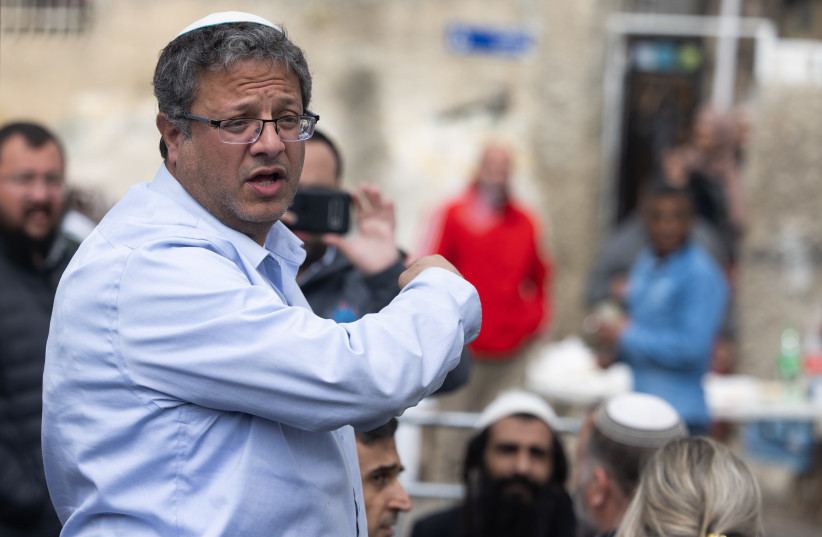Similar to almost every Israeli and many Palestinians I know, I would be very happy if Hamas would suddenly disappear. I could easily say the same regarding Israel’s most extremist political parties as well, such as Itamar Ben-Gvir’s Otzma Yehudit or Bezalel Smotrich’s Religious Zionist Party.
Unfortunately, that is not going to happen – not on the Palestinian side and not on the Israeli side.
These extremist political parties are part of the fabric that are deeply embedded in our political cultures. The only thing that will weaken the strength of these parties of hate would be a genuine peace process between the Israeli and Palestinian people that proves the test of time.
Political parties of hate thrive on conflict, poverty, shallow religious ideology and fear. Political parties of hate within conflict zone strengthen each other across the conflict line.
The greater the hatred and racism on one side of the conflict, the stronger the party of hatred and racism becomes on the other side. The extremists on both sides of the conflict are in fact partners and collaborators in deepening the conflict and their actions and verbiage feed off each other.

This cycle of enhancing the power of the extremes has a built-in power of momentum, particularly when there is an absence of leadership with the desire, ability and power of persuasion based on integrity that can turn the conflict in the direction of trying to make peace.
I believe that it important to try to understand the extremists within our societies. It is important to understand what they think and more importantly how they came to hold the extreme opinions that they believe in. It is important to listen to them. I have tried to engage the extremists within Israeli society.
More often than not, they refuse to talk to me because they see me as a traitor (just read the talkbacks to my weekly column in The Jerusalem Post). Some call me a “useless idiot.” More call me a self-hating Jew, an anti-Zionist... (fill in the blank). But most use an array of synonyms for the word “traitor.” It is difficult to approach them and have a conversation which does not become ugly.
I have also made many attempts to speak with the extremists on the Palestinian side. I have had some success, especially with some senior people in Hamas. However, it is very difficult because many of them refuse to speak with any Israeli. But because I believe it is very important to engage particularly with people who I have major disagreements with, I continue to try. I have lived by the motto that I am willing to speak to anyone who is willing to speak to me. I also believe that it is more important to listen and to try to understand than it is to try to score points.
From my experience, it is this approach of listening and trying to understand that led to the development of trust between some of my interlocutors in Hamas and myself that had a direct impact on bringing Gilad Schalit home alive. It has also led to several ceasefires between Israel and Hamas. But it has not gone deep enough.
Understanding that Hamas is not going to disappear and also understanding that the harder Israel hits Hamas or for that matter, the harder that Israel hits the Palestinian people, the stronger Hamas becomes. It is essential that we break the deadlock of non-engagement.
I had my first conversation with a PLO official in 1976. That person then told me that the PLO would never recognize Israel nor negotiate with Israel. In 1993 the PLO recognized Israel and negotiated with Israel. It took 17 years from my first attempts of engagement with the PLO to get to the negotiating table.
I had my first conversation with a senior Hamas person in 2006, 16 years ago. I have spoken directly with a Hamas official from an office in the Defense Ministry in Tel Aviv as well as from an office of a government minister in the Knesset. I have been instructed many times by Israeli officials to engage with some senior Hamas officials and have communicated back to those officials the content of my discussions.
In my 16 years of speaking with Hamas officials and reporting to Israeli officials, I so often feel that we are playing in the playground of a kindergarten. Who takes the first step is contested so much more than the content. Rather than speaking directly, I have so often had to play a game of transmitting convoluted messages so that the other side won’t get the idea that they are actually willing to speak and deal with each other.
At least one former Israeli prime minister and many former senior officers from the army and agents from the Shin Bet and the Mossad have said on record that Israel should speak directly with Hamas.
It is true that with one or two exceptions there are not many senior officials in Hamas who have stated publicly that Hamas should speak directly with Israel, but that is also part of the power dynamics and the total lack of symmetry. While I continue to conduct my private contacts with senior Hamas officials, I am once again trying to create greater public support in Israel and in Palestine for direct engagement between Israelis and Hamas officials.
In the past I tried to create a discreet “academic” dialogue between the two sides and while I had a large list of Israelis who wanted to join, the counterparts from the Islamic University of Gaza were denied the ability to participate by the Hamas leadership. I will continue to try to create opportunities for direct engagement and eventually I will succeed.
The writer, a political and social entrepreneur, has dedicated his life to Israel, and to peace between Israel and her neighbors. He is now directing The Holy Land Bond.
